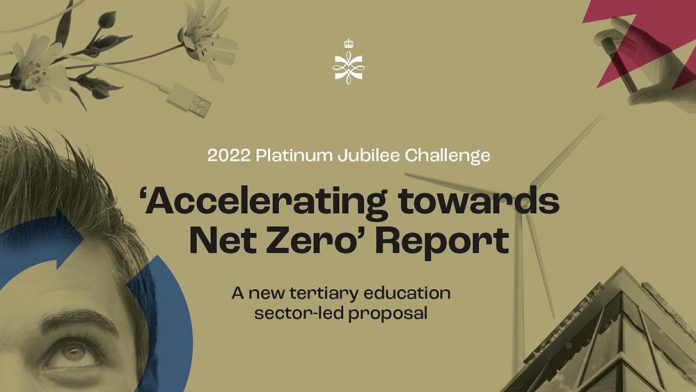What is the biggest unlocker for tackling the climate crisis? Sector leadership and system-wide collaboration. SB+CO Director Penny Baxter explains how The Platinum Jubilee Challenge has a vision for the UK tertiary education sector to become a global leader in accelerating the climate emergency response.
By bringing together 21 Further and Higher Education institutions over the last 12 months, the Challenge culminated in a recent report, ‘Accelerating towards Net Zero’, which showcases how the sector can help lead the UK’s transition to a low-carbon future. The Challenge and its report, led by sustainability consultants at SB+CO, contains 14 recommendations to government to support the sector as part of an ambitious roadmap for carbon reduction. This ground-breaking project has achieved something very unique.
At SB+CO, we were asked in early 2022 to lead the Platinum Jubilee Challenge, a pioneering project initiated in 2022 by The Royal Anniversary Trust, which is working with the 21 winners of The Queen’s Anniversary Prizes to tackle a shared challenge – how to accelerate the sector’s progress towards Net Zero.
Ranging from universities with their own world-leading climate research institutes, to colleges training our engineers of the future, we worked across the breadth of both the sector and the UK. Together with climate consultants EcoAct, we visited institutions, facilitated working groups, hosted a residential event, and conducted complex research. This helped us collect in-depth insights on how the sector could make the biggest impact towards reducing its carbon emissions. Most importantly, we wanted to demonstrate what could be achieved if tertiary education institutions truly worked together and leveraged the sector’s unique position, knowledge, and experience.
The new report, funded by the Department for Education and co-created by the Challenge participants, also includes the first ever Carbon Footprint for the sector (including Scopes 1, 2, and 3), delivered in partnership with EcoAct. In parallel, a new Standardised Carbon Emissions Framework (SCEF) was created by The Alliance for Sustainability Leadership in Education (EAUC), with input from the sector. These outputs provide the foundations for emissions reporting for the whole sector by taking a data-led approach to informing decision-making and behaviour change.
With the proposed Reporting Framework, FE and HE institutions will now be able to measure, report, and manage their carbon emissions by taking a staged approach to data maturity. This aims to bridge the gaps of experience and investment that have previously prevented some institutions from reducing their emissions, helping to level the playing field. It will be accompanied by a new data reporting platform for the sector, due to be delivered by the Department for Education later this year.
The report also provides three Action Pathways for institutions to focus their efforts: the Built Environment, Travel and Transport, and Sustainable Supply Chain, with detailed priorities for the sector to pursue. These three areas make up 80% of the sector’s
18.1 MtCO2e emissions, including all direct and indirect emissions. Within each pathway, the report provides insight on leading practice, challenges, and priorities for the sector to act on. The aim is to provide institutions across the sector with the means to get started, or progress further, on their journeys towards Net Zero.
The UK government is addressed in the report via 14 recommendations, focusing on areas identified to be of greatest potential impact, such as access to the core skills needed to decarbonise estates, calling for public funding bodies to go further to drive down research-related emissions, creating a shared knowledge platform, and supporting SMEs to increase their climate capabilities within the sector’s supply chain. A core part of this, of course, is access to funding and increased investment from the government to drive these interventions. UK ministers are expected to respond to these recommendations by 28th March 2023.
We’re very proud to have been part of this unique Challenge. We were not only able to connect a broad range of FE and HE institutions from all over the UK, but also enable conversations across their professional services, academic, and estates departments for the first time. The importance of partnership and collaboration was crucial to the success of the Challenge and part of the overall Mission that the participants developed for the sector’s response to the climate crisis:
“The UK’s tertiary education sector will be a global leader in accelerating the climate emergency response and leading a just transition for people and the planet. It will take a systems approach to reducing greenhouse gas emissions, building climate resilience, protecting and enhancing nature, and putting people at the centre. The sector will use its strength in connecting knowledge and scaling new solutions through partnership and collaboration.”
There is not only a moral imperative for the sector to lead a just transition for people and planet through education and academic thinking, but an enormous opportunity to equip future generations with the right skills, mindsets and behaviours to deal with the huge transition that climate change represents. We aspire for this report to unlock solutions for the rest of the education sector and set a precedent for climate action across the UK and beyond.



